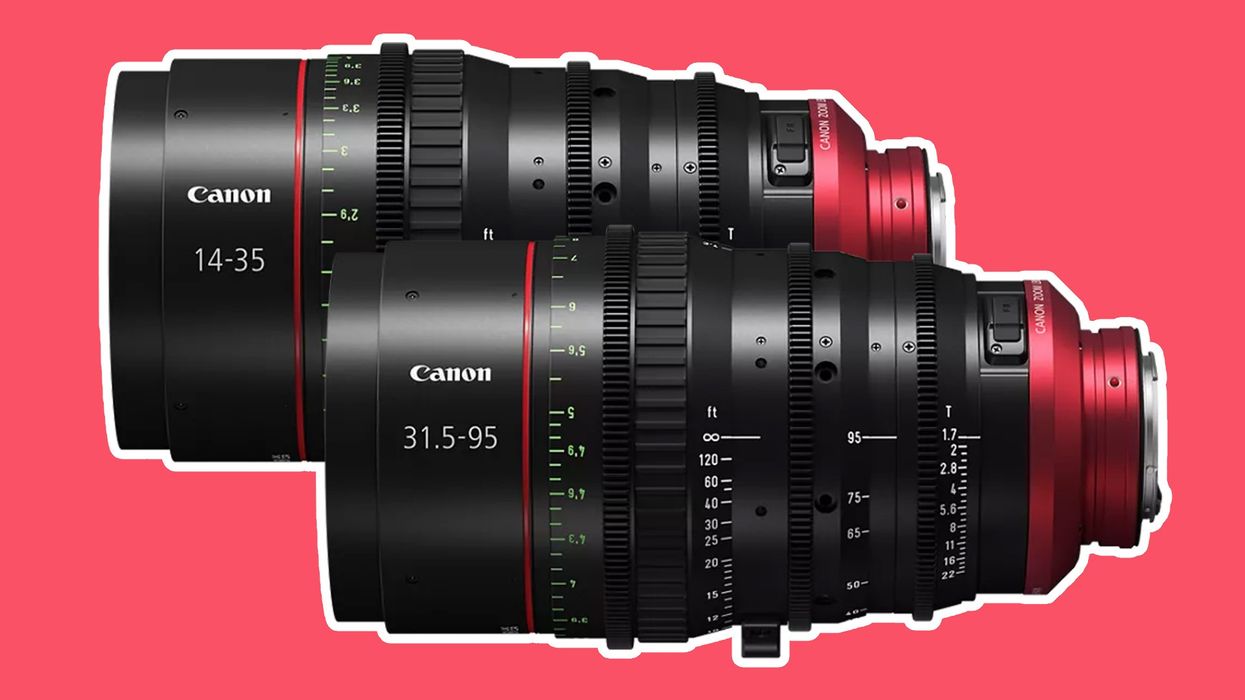Canon’s New Super 35 Cine Zooms Prove the Format Is Here To Stay
Canon’s new cine glass is versatile enough for creatives that need to adapt.

It only felt like a few years ago that the Super 35 format was slowly being replaced by full-frame. But with the release of the ARRI Alexa 35, RED Komodo, the RED V-RAPTOR 8K S35, and the killer Fujifilm X-H2S, it’s now more popular than ever.
This is why lens manufacturers have been quick to support the new capture systems with new lenses.
With the new Canon CN-E Flex Zoom 14-35mm T1.7 and CN-E Flex Zoom 31.5-95mm T1.7, Super 35 shooters get another option. But is it an option those shooters should consider?
Canon Super 35 Flex Zooms
An extension of the full-frame Flex Zooms, both of the new additions are killer pieces of glass building upon Canon’s long history. Each one is available in either PL or EF mount (a lens mount that likely won’t die anytime soon), and can be swapped between the two by a local lens shop.
There are 11-iris blades that give creatives a constant aperture of T1.7 for both lenses, making them blazing fast when used on Super 35 productions.
According to Canon, they are designed for 8K image capture and, due to their similar build size, are perfect for narrative and non-narrative projects that need to move fast.

You’ll find your standard stuff like gear zoom and iris rings, as well as built-in lens support connections, so you don’t put a strain on your EF mount (if you do end up going that route). Consistent gear placement, front-diameter size, and gear rotation ranges make for quick swaps, while luminous focus marks let you nail sharp focus, even in the dark.

Finally, no matter what mount you choose, you’ll get Cooke i/Technology metadata display and pass-through, which is a boon if you’re shooting VFX, as you’ll be able to get all your lens settings tagged right in your clip.
Not Only Super 35
Now, here's where things get a bit weird. With these two new lenses, Canon is also releasing two "relay" systems for the Super 35 and full-frame Flex Zooms. The RL-S1 and RL-S2 act as lens expanders for the Super 35 and focal reducers for the full-frame versions. If you have a set of one and need the coverage or speed of the other, you can get that.
This makes having two different versions of the lenses a bit redundant. It seems to us that they are all the same and can natively cover Super 35 or full-frame depending on what relay you're using. If both sets function in a similar way and can relay into one another, why have a different SKU? It's a head-scratcher to say the least.

Do These Lenses Meet Your Needs?
Canon’s recent lens additions have been technological, clinical, and precise. We wouldn’t have expected anything less. Having said that, they do lack a bit of sex appeal.
In a world where every lens is perfect, and each company sources its glass elements from only a few manufacturers, it’s hard to justify a $21,999 purchase. For that price, you're paying for the brand and the integrated features that aren't necessary for a lens to function.
Canon Super 35 CN-E Flex Zoom

- Covers Super35 Sensor Size
- T1.7 Constant Aperture, 11-Blade Iris
- 8K Performance
- Advanced Lens Metadata Support
- 114mm Front Diameter, 2' Close Focus
- 0.8 MOD Cine-style Focus & Iris Gears
- Luminous Focus Marks
- Canon EF Mount
If you’re eyeing these Canon zooms, they probably already perfectly fit your needs. But if you’re hoping for a lens to offer some sort of character, these might not be the lens for you. Canon Flex Zooms are workhorse lenses that provide not only efficiency but precision. If you need anything else, you can find a lot more character for a lot less if you look elsewhere.
But what do you think? Does the versatility of these lenses make you want them in your kit? Let us know in the comments!
Check out weekly specials, deals, and rebates: Pro Video Gear, Pro Audio Gear, Lighting













